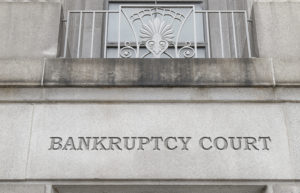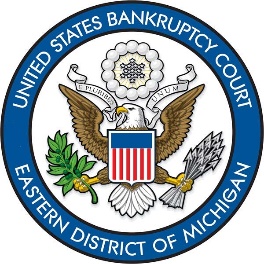Contents
What and where is the bankruptcy court in Michigan? A Michigan state court? A Federal court? Are there different courthouses in different cities? Who are the judges? Where do you appeal a bankruptcy court decision when a judge gets one wrong?
This blog post will discuss the bankruptcy court venue, its jurisdiction, and the appeals process from a bankruptcy court decision.
The U.S. Bankruptcy Court: What Is It?

The Bankruptcy Courts of the Eastern District of Michigan are located in Detroit (the southern division) and Flint and Bay City (the northern division).
The U.S. Bankruptcy Court is exactly that—a court of the Federal judiciary system. It is not a State of Michigan district or circuit court. A decision of the U.S. Bankruptcy Court that is appealed as far up the chain as it could possibly go would be eventually heard in front of the U.S. Supreme Court.
A state court decision can be appealed up to the Michigan Supreme Court (although it could also end up, beyond that, in the U.S. Supreme Court as well, if the matter impinges on a Constitutional or other point of Federal concern). More on bankruptcy appeals below, however.
The Federal Courts of the United States hear cases involving constitutionality issues, international or treaty-based legal issues, disputes extending across state lines or between two or states, maritime legal issues—and bankruptcy cases.
In Michigan, there are 2 Federal legal jurisdictions: the Eastern District of Michigan and the Western District of Michigan.
The dividing line for these jurisdictions runs essentially up the middle of the state, from the Indiana border to the tip of the Lower Peninsula. The Upper Peninsula of Michigan is part of the Western District of Michigan Federal District Court’s jurisdiction.
Each Federal District is sub-divided into “divisions.”
Both the Eastern and Western Districts of Michigan are subdivided into northern and southern divisions.
The U.S Bankruptcy Court in Michigan: Where Is It?

The Bankruptcy Courts of the Eastern District of Michigan are located in Detroit (the southern division) and Flint and Bay City (the northern division).
Depending upon the county in which you reside, your Chapter 7 or Chapter 13 bankruptcy case will be automatically assigned to one of these three Bankruptcy Courts.
The counties handled by the Bankruptcy Court in Detroit extend from Lenawee and Monroe counties at the southern border of the State right up to Genesee County and others.
The 341 Meeting of Creditors hearings are handled in Ann Arbor for the southernmost counties for Chapter 7 cases, but, if you file Chapter 13 or need to appear before a judge in your case, you may be driving more than an hour to downtown Detroit in the Eastern District. As of this writing, due to the Covid pandemic, all hearings are being held remotely via telephone or video conferencing.
Likewise, from the northern tip of the Lower Peninsula, if you reside in Cheboygan County, you’ll be driving southward to Bay City for your hearings.
In the Western District of Michigan, the Bankruptcy Courts are located in Grand Rapids, Kalamazoo, Lansing, Traverse City, and Marquette.
Again, if you’re just on the Michigan side of the Indiana border, you’ll be driving at least to Kalamazoo for your case.
Thus, bankruptcy in Michigan is not a particularly “local” process.
Given that your case will be potentially far removed from your home base, one of the worst reasons to hire a bankruptcy lawyer is because his or her office happens to be convenient to your home or place of employment.
Regardless of whom you hire, you’ll be driving to the same location anyway. (The only worse reason for selecting an attorney than geography is price.)
Seek out an experienced bankruptcy lawyer, not just the cheap one around the corner. You may get what you pay for.
Who Are the Bankruptcy Court Judges?
Bankruptcy Court Judges are Federal administrative law judges appointed by the circuit court judges in the jurisdiction in which their bankruptcy court sits.
Thus, in Michigan, Bankruptcy Court judges are appointed by a majority vote of the judges of the Sixth Circuit Court of Appeals.
Bankruptcy Judgeships are not life tenured appointments, as Federal judgeships are. They run for 14-year terms, which can be renewed by the Circuit Court upon expiration.
Requirements for appointment are set locally, and they primarily involve duration of the practice of law and other such criteria.
In the Eastern District of Michigan, there are—as of this writing—six Bankruptcy Court judges.
In the Western District of Michigan, there are three judges.
Nearly all of them are the product of “tall building” corporate law firm prior employment, a prior state court judgeship, or creditor representation—or a combination of all of these things.
Not a single Michigan Bankruptcy Judge has ever represented debtors in consumer bankruptcy cases.
Can I Appeal a Bankruptcy Court Decision? Where?
Decisions of Michigan Bankruptcy Court judges are appealed up the chain of the Federal appellate judiciary.
In the Eastern District, if displeased with a decision of a Bankruptcy Court judge, you can elect to appeal the decision either to the Federal District Court (in Detroit, across Fort Street from the Bankruptcy Court building at 211 W. Fort) or to what is known as the Bankruptcy Appellate Panel (or “BAP”) of the Sixth Circuit Court of Appeals.
The Sixth Circuit BAP is a panel of three bankruptcy judges from districts within the Sixth Circuit.
If displeased with the results of an appeal to either venue, a further appeal may be made to the full Sixth Circuit.
From there, further displeasure will require the filing of a Writ of Certiorari, requesting the case to be heard by the US Supreme Court.
Oral argument is not always permitted at the appellate level. The District Court will docket a hearing if it deems it useful but will otherwise determine the merits of the appeal based upon the record and other pleadings filed.
Michigan Bankruptcy Courts: The Bottom Line
The bottom line is that the U.S. Bankruptcy Courts are a very specialized venue requiring the retainer of an attorney with specialized knowledge of not only bankruptcy law but also Local Bankruptcy Court Rules, Procedures, and of the judges themselves and even their clerks, court officers, and other staff members.
When deciding to retain a bankruptcy lawyer to assist you with your Chapter 7 or Chapter 13 filing, be sure to retain an attorney who knows the lay of this particular land and will navigate you to your successful bankruptcy discharge and your fresh start with a minimum of stress and confusion.
Attorney Walter Metzen is a Board Certified Bankruptcy Expert who has successfully represented thousands of Chapter 7 and Chapter 13 clients in Michigan bankruptcy matters for over 30 years.
Contact us to schedule your free, initial consultation.




